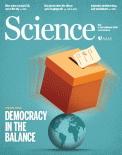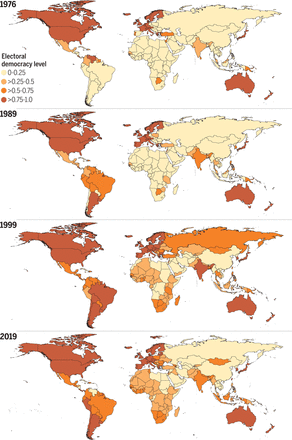 As democracy’s global tailwinds shift to headwinds, there is opportunity to better understand how experience with even superficial forms of democratic institutions influences citizen behavior when formal democratic institutions erode or disappear and to examine whether citizen movements alone—absent external support—are sufficient to check newly emboldened autocrats, notes Susan D. Hyde of the Travers Department of Political Science, University of California, Berkeley.
As democracy’s global tailwinds shift to headwinds, there is opportunity to better understand how experience with even superficial forms of democratic institutions influences citizen behavior when formal democratic institutions erode or disappear and to examine whether citizen movements alone—absent external support—are sufficient to check newly emboldened autocrats, notes Susan D. Hyde of the Travers Department of Political Science, University of California, Berkeley.
Research on the international diffusion of democracy has highlighted coercion, competition, emulation, and learning as the central mechanisms by which democracy spreads (32), she writes for a special issue of Science magazine on Democracy in the Balance:
 Recent studies have linked such processes to great power transitions at the system level, arguing that whether the most powerful country in the world is democratic or authoritarian causes global waves of regime transitions (although regimes that result from these transitions are not necessarily durable) (2, 40). Additionally, other studies have shown that countries were more likely to democratize when they had more economic and political linkages with Western countries (41), were members of intergovernmental organizations with more democratic members (1, 7), or were geographically proximate to other democracies (31). Relatedly, democracy promotion and foreign aid conditioned on democratic reforms have been shown to have meaningful, positive effects on democratization (2, 6, 42).
Recent studies have linked such processes to great power transitions at the system level, arguing that whether the most powerful country in the world is democratic or authoritarian causes global waves of regime transitions (although regimes that result from these transitions are not necessarily durable) (2, 40). Additionally, other studies have shown that countries were more likely to democratize when they had more economic and political linkages with Western countries (41), were members of intergovernmental organizations with more democratic members (1, 7), or were geographically proximate to other democracies (31). Relatedly, democracy promotion and foreign aid conditioned on democratic reforms have been shown to have meaningful, positive effects on democratization (2, 6, 42).
Changing geopolitics mean not just a decline in Western support for democracy, but also probable increases in interference by Russia and China aimed at either undermining democracy or reducing the accountability of political elites to citizens, adds Hyde, citing research from the NED’s Journal of Democracy. Countries that have previously felt pressure to adopt democratic institutions will not be simply left to their own devices, free of any foreign interference. RTWT







